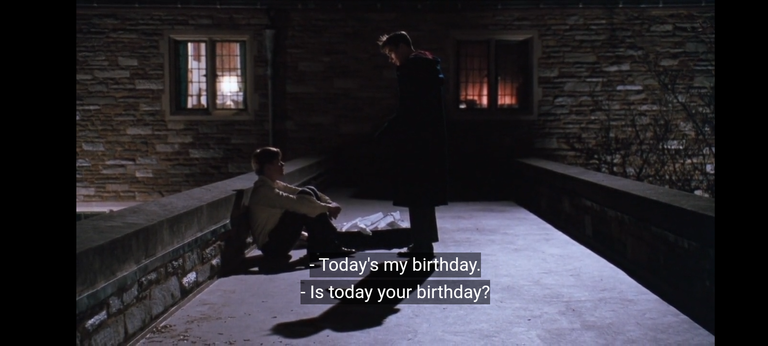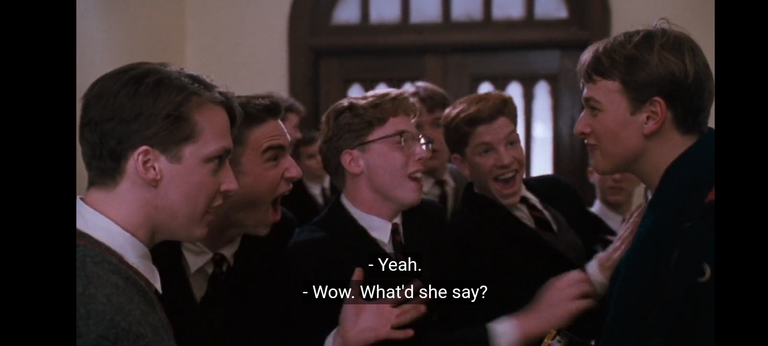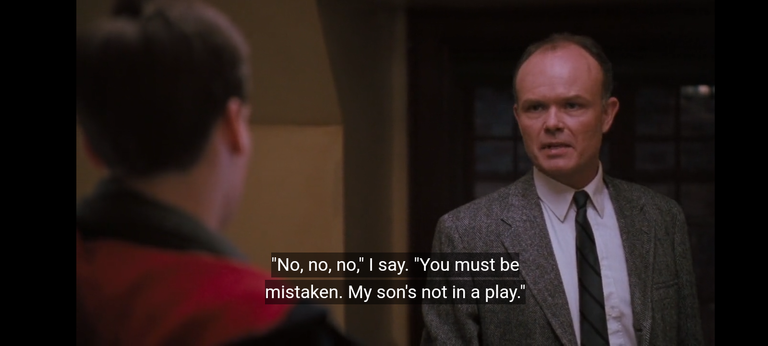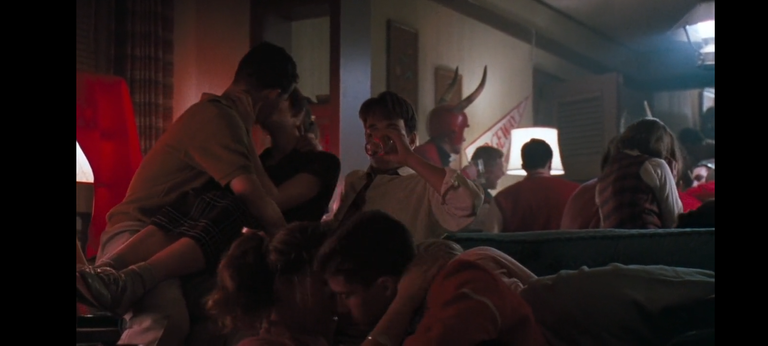Dead Poets Society, live your day as if it were your last. —eng/esp

VERSIÓN EN ESPAÑOL (click aquí)
He de admitir, señores, me obligaron a ver esta película aunque igual llevaba tiempo queriendo verla porque según tenía varias similitudes con Merlí, una serie catalana la cual aprecio mucho por los mensajes que da y deja al espectador. Así que obviamente encontré varias similitudes pero el mensaje acá es muy claro y marcado, te deja una sola enseñanza que quizás hasta se pueda definir como un estilo de vida. Hay una clara alabanza acerca del arte y la filosofía acá pero sobre todo se aprecia el pensar por nosotros mismos, desafiar lo preestablecido. Muchas personas no piensan acerca de esto, solo siguen los que se les dicta, solo siguen órdenes y no piensan ni en lo que hacen, solo lo hacen por hacerlo sin cuestionarse nada, copian y leen textos pero no saben el por qué, lo que puede llevar al adoctrinamiento en el peor de los casos. En gran parte donde más podemos encontrar esta problemática son en las aulas de clases y allí es donde entra La Sociedad de los Poetas Muertos, una película donde uno de los protagonistas haciendo el papel de profesor es el magnífico Robin Williams, la cual es otra de las razones que me llamó a verme la película, no he visto mucho de su filmografía pero era uno de los actores favoritos de mis padres. Así que sin más dilación, analicemos un poco, La Sociedad de los Poetas Muertos, una cinta de culto al día de hoy.
I must admit, gentlemen, they made me watch this movie even though I'd been wanting to see it for a while because it supposedly had several similarities with Merlí, a Catalan series which I appreciate a lot for the messages it gives and leaves the viewer. So obviously I found several similarities but the message here is very clear and marked, it leaves you with one single lesson that perhaps can even be defined as a lifestyle. There is a clear praise for art and philosophy here but above all it is appreciated to think for ourselves, to challenge the established. Many people do not think about this, they just follow those who dictate to them, they just follow orders and do not think about what they do, they just do it without questioning anything, they copy and read texts but do not know why, which can lead to indoctrination in the worst of cases. In large part where we can find this problem more are in the classrooms and that's where Dead Poets Society comes in, a movie where one of the protagonists playing the role of teacher is the magnificent Robin Williams, which is another of the reasons that called me to see the movie, I haven't seen much of his filmography but he was one of my parents' favorite actors. So without further ado, let's analyze Dead Poets Society a little, a cult classic today.

VERSIÓN EN ESPAÑOL (click aquí)
La película nos sitúa en un colegio privado muy elitista y conservador llamado Marta, en el cual llegará un nuevo profesor con métodos pocos ortodoxos para enseñar llamado John Keating a cambiar un poco el sistema, pero antes de la primera clase nos presentarán a Neil Perry y Todd Anderson, los cuales serán nuestros "protagonistas", unos alumnos sometidos a las presiones de sus padres, teniendo que cumplir todas sus expectativas a rajatabla, sin poder protestar en lo absoluto. La primera y segunda clase de Keating están fuera de lo convencional, dice que lo que dicta el libro de enseñanza está mal y le ordena a los estudiantes a salir del aula, que le sigan, donde se les enseña mediante un poema el concepto de Carpe Diem, que significa "aprovecha el día", haz lo que tengas que hacer, no tengas miedo, porque damas y caballeros, en cualquier momento podemos estar muertos. La película girará en torno a esto, reviviendo una sociedad que anteriormente había creado Keating debido a la curiosidad de cuatro alumnos (entre ellos Todd y Neil), siendo esta vez liderada por Neil, en el cual compartirán sus experiencias y sentimientos mediantes poemas, en una cueva un poco alejada del colegio, para volver a descubrir su verdadero yo. Una trama inspiradora que dejará a más de uno pensativo con lo que ha estado haciendo hasta ahora y a otros motivados con el sentimiento de querer aplicar el Carpe Diem en su día a día.
The movie is set in a very elitist and conservative private school called Marta, in which a new teacher with unorthodox methods for teaching called John Keating will arrive to change the system a little, but before the first class we will be introduced to Neil Perry and Todd Anderson, who will be our "protagonists", some students subjected to the pressures of their parents, having to meet all their expectations to the letter, without being able to protest at all. The first and second class of Keating are out of the ordinary, he says that what the teaching book dictates is wrong and he orders the students to leave the classroom, to follow him, where he teaches them through a poem the concept of Carpe Diem, which means "seize the day", do what you have to do, don't be afraid, because ladies and gentlemen, at any time we can be dead. The film will revolve around this, reviving a society that Keating had previously created due to the curiosity of four students (including Todd and Neil), this time led by Neil, in which they will share their experiences and feelings through poems, in a cave a little away from the school, to rediscover their true self. An inspiring plot that will leave more than one thoughtful with what he has been doing so far and others motivated with the feeling of wanting to apply the Carpe Diem in his day to day.

VERSIÓN EN ESPAÑOL (click aquí)
Cada uno de los integrantes de la sociedad de los poetas muertos comienza a gustarle la poesía y terminan logrando sus objetivos, pero los que más destacan y marcan el desarrollo de la película son los de Neil Perry y Knox Overstreet, quienes terminan aplicando el Carpe Diem de formas distintas y con resultados totalmente opuestos. Neil descubre que su pasión es el actuar y que es muy bueno en ello, por lo que decide inscribirse sin importar lo que piense su papá, luego éste al enterarse le da el regaño de su vida que se resigne de eso, Neil opta por pedirle consejo a Keating quien ejerce de figura paterna y le dice que le diga lo que de verdad siente, cosa que Neil nunca se dignó a hacer, prefirió suicidarse habiendo actuado y siendo feliz por primera vez en su vida a tener que esperar a que pasaran 10 años aprisionados para que pudiera hacer lo que de verdad quisiera, algo que él no consideraba estar vivo. Knox Overstreet, llevó el Carpe Diem hasta el final, no le importó nada de lo que la gente pudiera decir de él, ni pensó en las consecuencias de lo que pudiera llegarle a pasar, lo hizo todo para conquistar el amor de una chica y lo consiguió, usó hasta el último recurso todo para conseguir su objetivo. Quién sabe qué le hubiera ocurrido a Neil si le hubiera contado a su padre sobre su verdadera pasión, en la obra su papá hasta se le ve un poco orgulloso por la buena actuación y la tremenda ovación que se lleva Neil pero aún así termina regañándole, lo que da un poco de rabia.
Each member of the society of dead poets begins to like poetry and ends up achieving their goals, but the ones that stand out the most and mark the development of the film are Neil Perry and Knox Overstreet, who end up applying the Carpe Diem in different ways and with totally opposite results. Neil discovers that his passion is acting and that he is very good at it, so he decides to enroll without caring what his dad thinks, then he finds out and gives him the scolding of his life to resign from that, Neil chooses to ask for advice from Keating who acts as a father figure and tells him to tell him what he really feels, something that Neil never bothered to do, he preferred to commit suicide after acting and being happy for the first time in his life than to have to wait 10 years imprisoned so that he could do what he really wanted, something that he did not consider to be alive. Knox Overstreet took the Carpe Diem to the end, he didn't care what people might say about him, or what consequences might come to him, he did everything to conquer the love of a girl and he succeeded, he used every resource to achieve his goal. Who knows what would have happened to Neil if he had told his father about his true passion, in the play his dad even looks a little proud of Neil's good performance and the great ovation he gets but still ends up scolding him, which is a little frustrating.

VERSIÓN EN ESPAÑOL (click aquí)
Y es que técnicamente no hay final feliz en la obra, a alguien hay que culpar por la muerte de Neil y Keating debe pagar, hay que echarle la culpa a sus métodos de enseñanza. Se ve como la autoridad vuelve a imponerse y provoca que uno de los miembros de la sociedad, los traicione, queriendo salvarse el pellejo y echarle la culpa al profesor cuando él también era alguien que disfrutaba de sus clases. Todos los de la sociedad son obligados a firmar un papel donde se le culpa a Keating sobre todo, forzados tanto por los padres como por el director, bajo la amenaza de expulsión. ¿Esto es lo que pasa cuando voy en contra de la autoridad? Un evidente miedo se le puede infundir a los alumnos mediante a esta acción tomada. Cuando Keating va a recoger sus cosas en el aula de clases, sucede lo inesperado, "oh, capitán, mi capitán" exclama parado encima de su pupitre Todd, quien había podido lograr su miedo a hablar en público antes, provocando un último acto de rebelión en contra del sistema, un efecto en cadena se crea donde la gran mayoría de los compañeros de clase se levantan para exclamar y hacer lo mismo. Eso es todo, no hay más. Posiblemente tantos ellos como Keating hayan sido expulsados y en su adultez sean esclavos del sistema, por el miedo de volver a sufrir consecuencias. Aunque lo que nos enseña La Sociedad de los Poetas Muertos es a vivir la vida, aprovechar cada momento y saber cuándo hacerlo.
It is because there is no happy ending in the play, someone has to be blamed for Neil's death and Keating must pay, it is necessary to blame him for his teaching methods. It is seen how authority is imposed again and causes one of the members of society, the traitor, to want to save his skin and blame the teacher when he was also someone who enjoyed his classes. All members of society are forced to sign a paper where Keating is blamed above all, forced by both parents and the director, under the threat of expulsion. Is this what happens when I go against authority? An evident fear can be instilled in students by this action taken. When Keating goes to pick up his things in the classroom, the unexpected happens, "oh, captain, my captain" exclaims Todd standing on top of his desk, who had been able to achieve his fear of public speaking before, causing a final act of rebellion against the system, a chain reaction is created where the great majority of classmates stand up to exclaim and do the same. That's it, there's no more. Possibly as many of them as Keating have been expelled and in their adulthood they are slaves of the system, for the fear of suffering consequences again. Although what Dead Poets Society teaches us is to live life, to take advantage of every moment and to know when to do it.
Traducido con ChatGPT / Translated with ChatGPT via https://hivetranslator.onrender.com